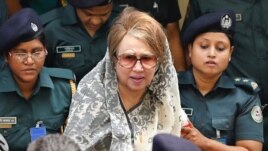24 September, 2018
The largest opposition party in Bangladesh is holding huge protests to demand the release of their jailed leader, former Prime Minister Khaleda Zia.
The Bangladesh Nationalist Party (BNP) says the country cannot hold free and fair elections without Zia's freedom. Voting is expected to take place in December.
A court sentenced the 73-year-old politician to prison in February. It had earlier found her guilty of misusing foreign money meant for an aid organization.

Former Prime Minister Khaleda Zia, chairperson of Bangladesh's largest opposition party of BNP, is being taken to a hospital in Dhaka from her jail for certain medical tests, Apr. 7, 2018.
Muhammad Jamiruddin Sircar is a top BNP leader and former President of Bangladesh.
"If Khaleda Zia can work freely leading the party during the election campaign, BNP will win...and form the next government," he said. "They are keeping her in jail simply to keep her away from our party's election campaign."
BNP leaders also spoke of dangers to Zia in jail. A.K.M. Wahiduzzaman told VOA that Zia is being kept in a decaying jail without important medical care.
"They are gradually pushing her towards death."
Change of power
Since 1991, control of Bangladesh has moved between two parties: the BNP and the Awami League. Bangladeshi Prime Minister Sheikh Hasina leads the Awami League.
Between 1991 and 2006, Zia was the prime minister for three terms and Hasina for one. In 2009, Hasina became prime minister again and the Awami League has led the government since then.
Opposition arrests
Zia, her son and four others were accused of misusing $252,000 of foreign money meant for a non-profit aid organization. In February, a court sentenced her to five years in jail. Five others, including her son, received jail terms of 10 years each.
Thousands of BNP leaders and activists have been arrested in recent months, mostly on charges of political violence.
Dhaka University law professor Asif Nazrul said the arrest and detention of opposition leaders and activists is still happening. He said the current government hopes to weaken BNP's ability to take part in the elections and the government-run media is damaging the image of the BNP.
But Awami League official Mahbubul Alam Hanif denied the arrests are political.
He said that, in 2013, 2014 and 2015, many BNP leaders and activists took part in violence, killing or injuring people. He said law enforcement agencies are acting correctly and that innocent people will not be arrested.
New demands
Earlier this month, BNP presented a list of demands for the government before it takes part in the election. They included Zia's release and the suspension of Parliament.
But, Food Minister Kamrul Islam said the government would not meet any such demands. He said elections would be free, fair and follow the Constitution.
The BNP boycotted elections in 2014 when their demands were not met. That will not happen this time, said official A. K. M. Wahiduzzaman.
"But, we will make our best effort to campaign and take part in the national election this time."
I'm Alice Bryant.
Maaz Hussain wrote this story for VOA News. Alice Bryant adapted it for Learning English. Caty Weaver was the editor.
_____________________________________________________________
Words in This Story
decaying – adj. to go slowly from a bad condition to a worse condition
gradually – adv. happening in a slow way over a long period of time